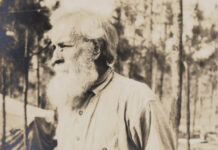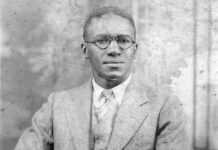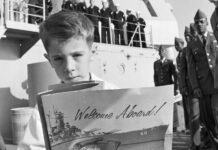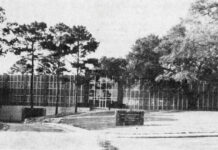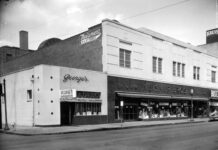Part III

Vietnam shaped a generation of Americans and changed the country forever. The divisive conflict lasted well over a decade, during which more than 58,000 Americans were killed and 300,000 were wounded. The war bitterly divided the nation, bringing protests and mistrust of the government, as well as inflation and a reluctance to enter into foreign conflict for decades. It saw an end to the draft and it lowered the voting age. Soldiers returned home to name-calling instead of ticker-tape parades and many veterans struggled to make sense of the horrors of war. Despite all that, many south Alabamians bravely fought for their country and did their duty as soldiers, medics, and more. Of the approximately 2.7 million Americans who served in the war, less than 600,000 are alive today. In honor of the 50th anniversary of the fall of Saigon and the end of the Vietnam War on April 30, 2025, Mobile Bay Magazine is sharing the stories of four local veterans in four monthly installments. We honor their bravery and commitment to our country, and thank them for their service.
First Class/Lance Corporal Elbert Wingfield
Elbert Wingfield enlisted in the U.S. Marine Corps because President Kennedy said, “Ask not what your country can do for you; ask what you can do for your country.” Those words stuck with him. A few years later, President Johnson said the U.S. needed men to go to war and showed videos of violence in Vietnam.
“I wanted to stop that from happening, so I went to war,” Wingfield said.
He was 18.
Wingfield was sent to the American air base outside Danang, an entry point for American service members flying into Vietnam. The base was also used for offensive air operations within South Vietnam, supporting the Marine Corps and Army of the Republic of Vietnam (ARVN).
Wingfield’s Military Occupational Specialty (MOS) was 3051: shooting mortars from the rear, not fighting directly on the ground. “I felt good about that, but they changed my MOS to 0311 on the plane,” he said. That change meant Wingfield would be a rifleman for the 27th Marines. A grunt. The first to fight. There was no time to adjust or settle in. He was assigned to patrol the night he arrived.
It was monsoon season in Vietnam — dark and raining so hard that he couldn’t see in front of him. He said he beat the bushes getting to the next place.
“We were told to get some rest, but how were we going to rest in all of that rain? I lay down with my M16 beneath my poncho to keep it dry. Nothing in boot camp prepares you for that.”
Boot camp didn’t prepare him for getting shot at, either. Every time a round of fire came close, he jumped into the bunker to avoid getting hit.
“A salty old white guy hit me on the shoulder, telling me to calm down. He said if one comes into our bunker, I won’t have to worry about anything,” Wingfield said. “I learned that incoming rounds sounded like bees.”
Wingfield landed in Danang in December 1967. A few weeks later, the North Vietnamese (NVA) and Viet Cong (VC) made a surprise attack on South Vietnam during the Lunar New Year. The attack, called the Tet Offensive, started the toughest year of fighting during the war.
The intense battle to keep the NVA and VC from the Danang base lasted for months. Wingfield was a point man watching for ambushes from VC hiding in tunnels and bamboo trees. He saw so many men next to him be killed that he felt guilty for being alive.
“I would ask ‘why him and not me?’” Wingfield said. “I quit making friends because I knew the next moment he could be gone. It’s still hard for me to get close to people.”
Wingfield’s sergeant was one of those he lost. The company took fire while dropping out of helicopters into the war zone for operation Allen Brook near Quang Nam. They walked through tall grass up to their waists on a search-and-destroy mission.
The sergeant ordered Wingfield and another Marine to move further inland, away from the bamboo tree line. Switching places, the sergeant put the Marines in the middle. With their M16s pointed up, they searched for the enemy. Wingfield glanced at his sergeant and heard a loud bang.
“I was blown into the air with sand and debris everywhere,” Wingfield said. “As I was falling to the ground, I looked to my right and thought our sergeant had fallen into a hole. But he stepped on a landmine that blew him apart.”
Wingfield said he lost it when he saw blood and what appeared to be “ground hamburger meat” on his flight jacket. The corpsman, a medic caring for wounded Marines, told Wingfield, “That isn’t your blood. Get it together.” Wingfield was all right.
“Hell had broken out, and we were in a firefight with the NVA Army,” Wingfield said. “I wanted to kill those who killed my sergeant.”


The 27th Marines fought for almost four months in the battle of Allen Brook to stop the NVA from attacking the Da Nang base. The NVA and VC dug in and hit the Marines hard; casualties were heavy on both sides.
“I helped put our comrades into body bags,” he said. “I could even see myself in one of the bags. I was a different Marine after Allen Brook. There were times I didn’t want to make it back.”
In one battle, Wingfield felt the rush of intense pain all over his body. He yelled and hollered, “Corpsman.” The corpsman poured water into Wingfield’s eyes to remove the debris. Wingfield lost vision in that eye but kept going.
“I didn’t know I also had a concussion on the right side of my head and body because of all the action,” he said. “My adrenaline was so high that I could bear the pain and take care of business with the enemy. We were trained that Marines don’t hurt or cry.”
Wingfield wasn’t afraid of dying in Vietnam. He feared the ways he could die: stepping on hidden booby traps or getting bit by a bamboo viper.
But if he could see the enemy before the enemy saw him, he would win.
“I was in a catch-22 situation,” he said. “The VC and NVA didn’t bother me because we were all men with rifles.”
The M16 rifle was first used in jungle warfare in Vietnam. But jammed ammunition was a problem, preventing soldiers from returning fire. Wingfield’s M16 worked, he said, because “I knew how to take care of it, and it knew how to take care of me.”
Agent Orange was another danger for both sides. For almost 10 years, the U.S. military sprayed millions of gallons of the toxic herbicide to remove leaves from the jungle cover shielding the VC, but exposure to the chemical caused illnesses for those on the ground. Wingfield was exposed to the herbicide and still has peripheral neuropathy that limits movement in his legs.
“Imagine looking at green trees and grass all around you,” he said. “The next day, a plane drops white powder on the trees, turning everything brown. Agent Orange killed the foliage to show the enemy where to drop the bombs. On patrol, we knocked back the dead leaves, but that covered us in the white powder, the poison.”

“War is hell, but I did my job and served my country well.”
Wingfield made it through Vietnam for his required 13 months. When he returned to Mobile, he was called a “baby killer” and told he couldn’t buy a home in a white neighborhood.
“As a Black man in Mobile, Alabama, in 1967, I was restricted to where I could live,” Wingfield said. “I went to war and fought for this country. I wanted to own a piece of it when I came home. The Vietnamese would say, ‘Black man, why are you here? You don’t have a country. They don’t want you in the United States. Why are you fighting us?’”
Wingfield met his wife, Jacqueline, while they attended rival high schools in Mobile. She prayed for him and wrote letters to him while he was in Vietnam.
“There was nothing like getting letters with perfume while in the war zone,” Wingfield said. “When I came home, Jacqueline helped me through the nightmares and hollering through sleepless nights. She still does. We have been married for 52 years.”
Wingfield started a business and got the piece of America he fought for. He owned Saucy Q restaurant for 36 years, “putting the Q in barbeque.” but is looking for something new to occupy his time because, as he said, Vietnam is always in the back of his mind. After almost 50 years, he finally got the payment for the eye he lost in Allen Brook and is getting treatment for the hole in the retina and traumatic glaucoma in his other eye.
“War is hell, but I did my job and served my country well,” Wingfield said. “There were a lot of things I kept quiet about when I got out of the service. I tried to erase them from my mind. At least now I can say I was a Marine in the Vietnam War.”
Also in the Series:
Part I: First Lieutenant Skeeter Morris | Part II: General Guy Hecker

